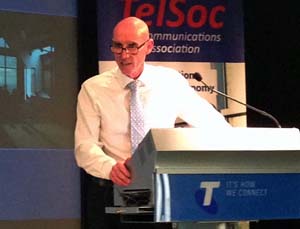Don't let politics distort NBN cost: Former NBN Co CEO

Ahead of the release of the strategic review, undertaken by the new management of NBN Co appointed by Communications Minister Malcolm Turnbull, NBN Co's first employee and CEO Mike Quigley has urged the company to avoid further politicising the project by taking into account the cost savings that would have offset a rise in the construction costs for fibre to the premises (FttP).
Quigley, who left NBN Co at the beginning of October, oversaw the establishment and commencement of construction of the former Labor government's AU$37.4 billion fibre-to-the-premises National Broadband Network (NBN). Speaking at a Telecommunications Association event in Telstra's George Street, Sydney, office on Monday night, the now retired CEO reflected on the challenges the company faced in starting up, and said it was no different to any major telecommunications startup, just on a much larger scale.
As had been widely reported over the last few months, as construction began to ramp up, Quigley said that some contractors had asked for rates to be raised, and for NBN Co to offset additional expenses incurred, he said that NBN Co was prepared to consider raising rates, but not if it would raise the cost of the overall network.
"Neither I or my management team were prepared to use taxpayers' money to spend our way out of the problem. As tempting as it may have been, we just weren't prepared to do that, even if it would have made our lives quite a bit easier," Quigley said.
"These rate increases obviously would have pushed up construction of the [network] if we had not identified and were prepared to execute on other identified savings. But of course we were. That is a normal part of running a company; you're constantly looking to find areas where things can be done more cost effectively.
"These savings can then be used to offset any areas where costs have gone up."
The former CEO said that NBN Co had found new cable developments, more efficient testing methods, smaller footprints for the multiports, reductions in fibre counts, and corrections in planning tools that allowed greater fill ratios for ducts. These would have offset the rise in construction costs, he said.
"At the end of September, NBN Co was on track to implement those cost reductions as any sensible company would have and they would have come in over the course of the project ahead," Quigley said.
"Rates to build the fibre network based on the existing design and architecture were rising, but those rate increases would not have produced a cost increase, because we had identified and validated network and design changes that would have offset those increases."
Any attempt for the new NBN Co to add the rise in construction costs without factoring in the cost savings would make no sense, Quigley said.
"I simply don't understand when I hear suggestions that the increases in [network construction rates] should be built into the forward projections now for the FttP business as usual and the cost reductions that have already been identified should be excluded," he said.
"It makes no sense. Unless, of course, your objective is to try and confirm some preconceived position."
On the politics of the NBN, Quigley said that there had been "deliberate efforts to impede the progress of the NBN" from the Coalition ranks, and the project would have been more successful had it enjoyed bipartisan support.
He reiterated his support for fibre to the premises, saying that risk lies in a fibre-to-the-node (FttN) network because it cannot be easily upgraded to FttP in the future — but he said that FttN could be achieved.
He advised the new NBN Co to not fall victim to seeking to make the review outcomes justify the Coalition's policy of fibre to the node.
"Even with all the work that has been done on the transit, satellite, greenfields, OSS/BSS, product and pricing and SAU, and the fact that you have a fully functioning company at your disposal, you do not have a minute to lose," he said.
"Do not waste your time being party to a rewriting of the FttP business case using nonsensical assumptions aimed to prove a predetermined outcome. That will only further politicise the project and ultimately delay you."
While the government is currently sitting on the strategic review, new NBN Co executive chairman Ziggy Switkowski last week indicated that there is an "upward pressure" on the cost of rolling out the NBN.
"Within the review, there will be an estimate of what costs are reasonably expected to be through the duration of the project fibre to the home, and my sense is most costs are higher than had been originally expected," he said.
Quigley also revealed that due to issues with Telstra duct remediation and asbestos material, the target date for the completion of the network has been pushed out another six months, to December 2021.
While Quigley has suggested that the NBN reviews are designed to provide Turnbull with his justification for moving to a fibre-to-the-node model, the former CEO has faced similar criticism from Turnbull for telling former Communications Minister Stephen Conroy what he wanted to hear, rather than the "unvarnished truth".
Quigley rejected the claim.
"I told it exactly as I saw it. And by the way, so did my chief operating officer, so did everybody I knew in the company," he said.
"When I met the new minister, I told him exactly as it is."
Shadow Communications Minister Jason Clare said the former CEO's concerns about the upgrade path of fibre-to-the-node should be listened to.
"Quigley makes it clear that it is not easy to convert fibre to the node to fibre to the premises. This is a real concern. Fibre to the premises is the end game. We need to be able to do this or we will be stuck using an old, second-rate copper network," he said in a statement.
